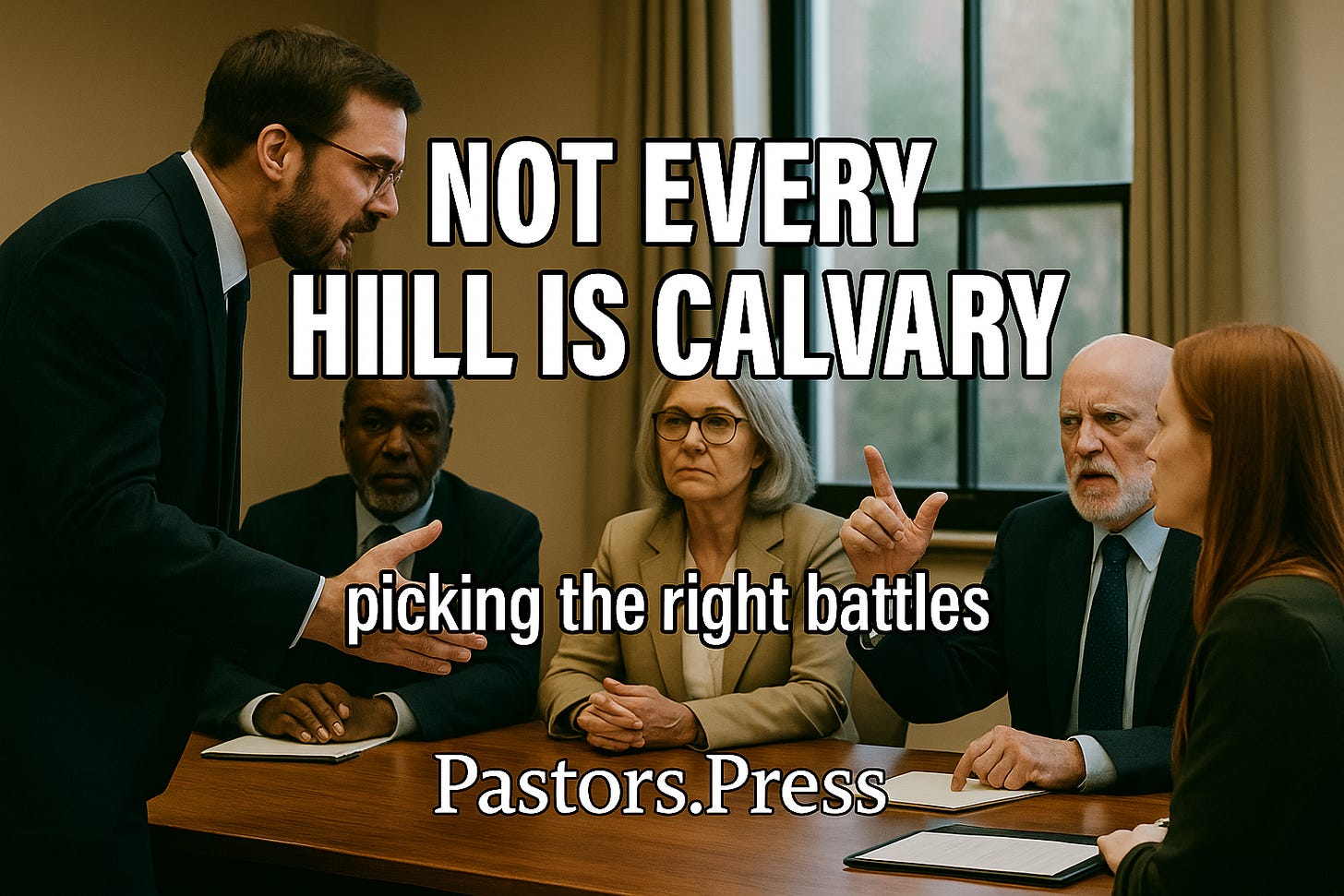Not Every Hill is Calvary
Picking the Right Battles
Key Verse:
“If it is possible, as far as it depends on you, live at peace with everyone.”
— Romans 12:18
Leadership in ministry inevitably involves conflict. As a pastor, you’ve likely stood at the foot of many hills—each one tempting you to climb, raise your voice, and draw a line in the sand. But not every hill is Calvary. Not every issue is worth the cost of division, burnout, or broken fellowship.
There are, of course, hills worth dying on—truths essential to the gospel, convictions rooted in Scripture, boundaries that guard the church from error. But far too often, pastors find themselves entrenched in battles that are more about personal preference, pride, or power struggles than about righteousness.
Discern the Difference Between Personal and Biblical Conviction
One of the hardest parts of pastoral ministry is learning to separate what feels urgent from what is truly essential. Some members will want to debate over the color of the carpet, the style of worship, or the font size in the bulletin. These are not gospel issues. They are preferences, and dying on those hills will drain your energy and credibility.
Ask yourself:
Does this issue impact the spiritual health of the church?
Is this a matter of biblical fidelity or personal comfort?
Will this matter five years from now—or even five months from now?
Jesus didn’t fight every battle. He remained silent before Pilate. He walked away from mobs. He corrected gently when necessary and stood firmly when eternal truths were on the line. His hill was Calvary. Ours should be chosen with the same care.
Practice Spirit-Led Patience
In leadership, sometimes the right hill at the wrong time becomes the wrong hill. Timing is everything. It may be that the church isn’t ready for a change in structure, a shift in staffing, or a new vision. That doesn’t mean it’s never right—it just may not be right now.
Jesus waited 30 years before beginning His public ministry. Paul waited years after his conversion before launching into apostolic leadership. Sometimes, the Spirit’s whisper is not “No,” but “Not yet.”
Use seasons of delay to teach, disciple, and lay groundwork. Build relational equity. Teach biblical principles. Let the sheep learn your voice before you challenge them with a new direction.
Consider the Cost of Every Conflict
Every time you step into a conflict, you spend something: relational trust, emotional energy, sometimes even spiritual authority. That’s not to say you should avoid all conflict—faithfulness often requires confrontation. But wise leaders count the cost.
Ask yourself:
What will this fight cost me relationally?
What kind of witness will this leave before the watching world?
Is the outcome worth the potential division?
The enemy loves a distracted shepherd. Satan doesn’t always attack through outright heresy—sometimes he just drains your strength through 10,000 little skirmishes that never needed to happen.
Teach Your People to Lead, Not Just Follow
Some battles arise because the pastor is expected to do all the leading, deciding, solving, and directing. But when the church is filled with spiritually mature, biblically trained lay leaders, many of those conflicts are resolved before they ever reach your desk.
Equip your people. Train your deacons and elders. Empower your ministry leaders. If your church learns to think biblically, act graciously, and serve humbly, you’ll find yourself fighting fewer battles—and leading with greater peace.
Pastor's Prayer Thought
Father, grant me the wisdom to discern which battles are worth fighting, and the grace to walk away from those that are not. Help me to lead with conviction, but also with compassion. Teach me to model Christ in every confrontation, and to always keep the cross in view. Amen.
Pastoring Tip of the Week
Before stepping into a conflict, pray for clarity. Not just clarity about the issue, but clarity about your own heart. Are you being driven by truth—or by ego? Are you protecting the flock—or proving a point? The best time to ask these questions is before you draw the sword.
Looking to Reduce Unnecessary Conflict in Your Ministry?
Equipping your congregation with strong biblical leadership is one of the best ways to avoid unnecessary battles. That’s why we created:
📘 The Ultimate Christian Leadership Manual – Volume One
📘 The Ultimate Christian Leadership Manual – Volume Two
These comprehensive guides are packed with lessons, discussion questions, and practical wisdom for developing leaders in your church who serve with both strength and submission. Teach your people to lead well—and you’ll spend less time fighting fires.
Note: All Scripture from the NIV Bible Translation.



